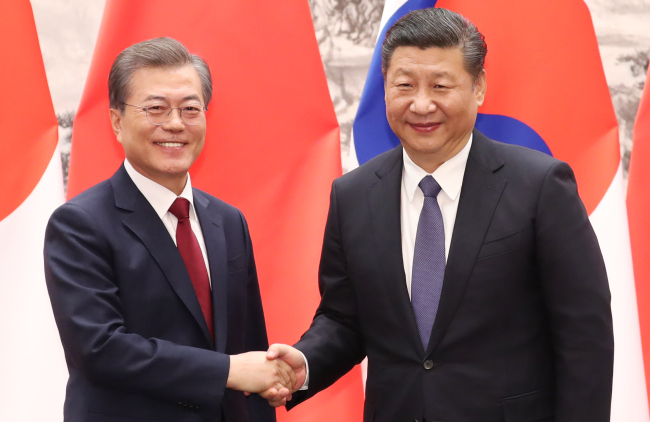President Moon Jae-in’s visit to China presents opportunity for South Korea to mend economic ties following a dispute over its deployment of a US anti-missile system, but challenges remain as Beijing appears to maintain its assertive stance on security issues.
Wrapping up his four-day state visit on Saturday, President Moon received reassurance from the Chinese leaders that Beijing will resume economic and trade cooperation that has been suspended since South Korea pressed ahead with the much-controversial installation of the Terminal High Altitude Area Defense battery.
But challenges loom over South Korea’s future dealings with China, as Beijing appeared to argue that the agreement was only “condition-based” and still wants the eventual removal of THAAD, pressuring Moon to choose between economic ties with China and a military alliance with the US.
“Although we have yet to resolve the THAAD issue completely, we expect there will be a dramatic decrease in the frequency and intensity of China’s mentioning of THAAD,” said a senior official from South Korea’s presidential office Cheong Wa Dae on Sunday, a day after Moon returned from his four-day visit to China.
 |
South Korea`s president Moon Jae-in shakes hands with his Chinese counterpart Xi Jingping. Yonhap |
The official, who told reporters under the condition of customary anonymity, said Moon and Xi have managed to remove “hard feelings” over the THAAD dispute and build personal trust by holding extensive meetings in different settings.
In a bid to reinvigorate stalled bilateral exchanges, the two countries decided to resume a total of 77 government-level talks between the two countries, including ministerial-level talks on economic cooperation, Cheong Wa Dae spokesperson Yoon Young-chan said Sunday.
The spokesperson reiterated president Moon’s pledge to link his economic policies to China’s ambitious Belt and Road Initiative. China, for its part, gave assurance that many Chinese tourists would visit South Korea during the 2018 PyeongChang Winter Olympics.
“The two countries agreed to restore stalled exchanges and cooperation and share a common understanding that they will continue to work on improving ties on practical matters,” Yoon said during the briefing.
Despite the presidential office’s reiterations of mending bilateral ties, analysts remained cautious about the prospect of future relations as both countries have yet to resolve THAAD disputes completely amid mounting criticism against China’s assertive stance on security issues.
One of their concerns is that the Chinese pledge to lift restrictive measures against the South Korean companies would be only “provisional,” depending upon the Moon administration’s stance over what China called “three no policies.”
Following the agreement to patch up the THAAD dispute in October, controversy has since emerged over whether Seoul made a pledge that it will never deploy an additional THAAD battery, participate in a US-led strategic missile defense system or create a trilateral military alliance with the US and Japan.
“It is a positive sign that both countries kicked off their efforts to improve bilateral relations, but given the apparent difference over THAAD, Seoul and Beijing must focus on managing their conflicts in the longer term.” Kim Han-kwon, a professor at Korea National Diplomatic Academy.
While South Korea insists that THAAD is only aimed at North Korea’s missile and nuclear threat, China suspects that its powerful radar system could be used to spy into its territory. In an interview with the Chinese state broadcaster CCTV before leaving Seoul, Moon said Beijing did not need to worry about the anti-missile system because South Korea would ensure that its radar does not penetrate Chinese territory.
By Yeo Jun-suk(
jaonsyeo@heraldcorp.com)








